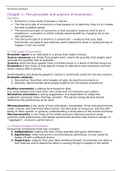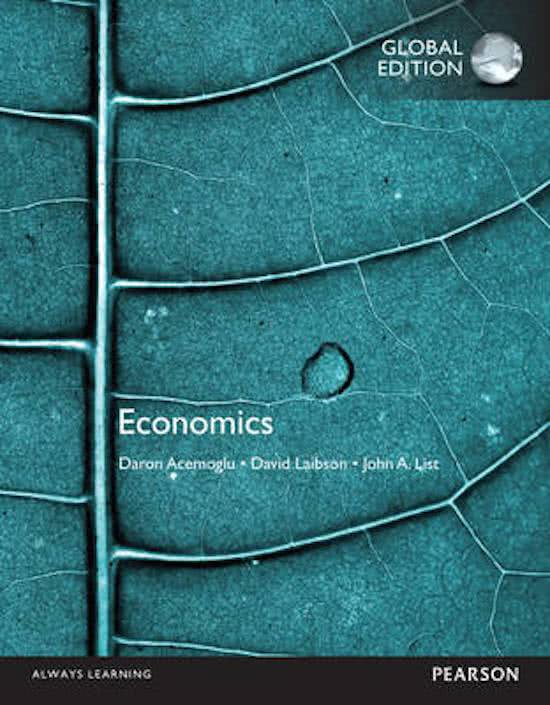Economics summary LH
Chapter 1: The principles and practice of economics
Key ideas
Economics is the study of people’s choices.
The first principle of economics is that people try to optimize; they try to choose
the best available option.
The second principle of economics is that economic systems tend to be in
equilibrium, a situation in which nobody would benefit by changing his or her
own behaviour.
The third principle of economics is empiricism —analysis that uses data.
Economists use data to test theories and to determine what is causing things to
happen in the real world.
1.1 The scope of economics
Economic agent is an individual or a group that makes choices.
Scarce resources are things that people want, where the quantity that people want
exceeds the quantity that is available.
Scarcity exists because people have unlimited wants in a world of limited resources.
Economics is the study of how agents choose to allocate scarce resources and how
those choices affect society.
Understanding and studying people’s choices is practically useful for two key reasons.
Economic analysis:
1. Descriptive: Describes what people actually do (positive economics).
2. Advisory: Recommends what people ought to do (normative economics).
Positive economics is stating facts based on data.
E.g. some people took more than one candy and not everyone got a piece.
Normative economics is giving suggestions. It is dependent on subjective
judgments (personal taste, feelings, opinion). The person being advised should
determine the preferences to be used.
Microeconomics is the study of how individuals, households, firms and governments
make choices, and how those affect prices, the allocation of resources, and the well-
being of other agents. In general, understanding a small piece of the overall economy.
Macroeconomics is the study of the whole economy. Macroeconomists study
economy-wide phenomena, and design government policies that improve overall, or
‘’aggregate’’, economic performance.
1.2 Three Principles of Economics
Economists emphasize three key concepts:
1. Optimization: making the best choice possible with given information.
2. Equilibrium: when everyone is simultaneously optimizing; no one would be
better off with a different choice.
3. Empiricism: analysis that uses data (evidence-based). Economists use data to
test theories and to determine what is causing things to happen in the world.
,Economics summary LH
1.3 The first principle of Economics: Optimization
Economic agents optimize by choosing the best feasible option with the
information they have. Feasible options are those who are available, affordable and
executable to an economic agent.
The definition of optimization also refers to the information available at the time
of choice.
Optimization means that we weigh the potential risks in a decision, not that we
perfectly foresee the future.
When someone chooses the best feasible option, he/she is being rational. Rational
action requires a logical appraisal of costs, benefits and risks associated with each
other.
Note that the test of optimization is the quality of your decision, and not the
outcome. In cases where agents fail to optimize, normative economic analysis
can help them realize their mistakes and make better choices in the future.
Trade-offs arise when someone benefits must be given up to gain another.
Budget constraint is the bundles of goods or services that a consumer can choose
given her limited budget.
E.g. when you spend an hour on Facebook, you cannot spend that hour working.
To describe this trade-off, the budget constraint is used:
5 hours = Hours on Facebook + Hours working
If you spend an extra hour on Facebook, you need to spend one less hour on working.
Opportunity cost is the best alternative use of a resource.
Assigning a monetary value to an opportunity cost makes it easier to analyse.
Cost-benefit analysis is a calculation that adds up costs and benefits using a
common unit. It is used to identify the alternative that has the greatest net benefit,
which is equivalent to benefits minus costs.
1.4 The second principle of Economics: Equilibrium
In an equilibrium, nobody perceives that they would benefit from changing their
behaviour.
The information they consider, also includes their beliefs of other’s behaviour.
The Free-Rider Problem exists when an individual or group can enjoy the benefits
of a situation without incurring the costs.
1.5 The third principle of economics: Empiricism
Empiricism is an evidence-based analysis where economists test their ideas with data,
to see if the theories about human behaviour match up with reality. They distinguish
causation and correlation.
,Economics summary LH
Chapter 2: Economic methods and economic questions
Key ideas
A model is a simplified description of reality.
Economists use data to evaluate the accuracy of models and understand how
the world works.
Correlation is not the same thing as causality.
Experiments help economists to measure cause and effect.
Economic research focuses on questions that are important to society and can
be answered with models and data.
2.1 The scientific method
The scientific method (empiricism) is composed of two steps:
1. Developing models that explain some part of the world.
2. Testing those models using data to see how closely the model matches with
what we observe.
Model is a simplified description of reality.
Two important features of models
o They are not exact. Not everyone will see their wages increase by 10%
with every additional year of education.
o They generate predictions that can be testes with data.
Empirical evidence is a set of facts established by observation and measurement.
Hypotheses are predictions that can be tested with data.
2.2 Causation and correlation
Causation is when one thing directly affects another.
E.g. pulling an all-nighter will make you tired.
Correlation is when two things are related; one changes, the other changes as well.
Positive correlation – they both change in the same direction.
Negative correlation – they change in opposite directions.
Zero correlation – they are not related.
Why isn’t correlation the same thing as causality?
1. Omitted variables
Something that has been left out of a study, if included, would explain why two
variables are correlated.
2. Reverse causality
When we mix up the direction of cause and effect.
How can we tell the difference between causality and correlation?
Experiment is a controlled method of investigating causal relationships among
variables.
Controlled – subjects are randomly put into treatment (something happens)
and control (nothing happens) groups by the researcher.
Problem: difficult to do with economic studies.
Natural – subjects end up in treatment or control groups due to something that
is not purposefully determined by the researcher.
Randomization is the assignment of subjects by chance, rather than by choice, to a
treatment group or control group.
, Economics summary LH
Two properties of a good economic question:
1. Relevant and important
Economic research contributes to social welfare.
2. Can be answered
Economic questions can be answered empirically.
Chapter 3 Optimization: doing the best you can
Key ideas
When an economic agent chooses the best feasible option, she is optimizing.
Optimization in levels calculates the total net benefit of different alternatives and
then chooses the best alternative.
Optimization in differences calculates the change in net benefits when a person
switches from one alternative to another, and then uses these marginal
comparisons to choose the best alternative.
Optimization in levels and optimization in differences give identical answers.
3.1 Two kinds of optimizations: a matter of focus
Behavioural economics jointly analyses the economic and psychological factors
that explain human behaviour.
3.2 Optimization in levels
Comparative statics is the comparison of economic outcomes before and after
some economic variable is changed.
Optimizing in levels calculates the change in net benefits when a person switches
from one option to another and then chooses the best alternative.
1. Express all costs and benefits in the same unit.
2. Calculate total net benefit (benefits – costs) for each option.
3. Choose the option with the highest net benefit.
3.3 Optimization in differences
Decision-making using marginal analysis:
E.g. comparison of choosing an apartment near work:
Principle of optimization at the margin
If an option is the best choice, you will be made better off as you move toward it and
worse off as you move away from it.
Optimizing in differences calculates the change in net benefits when a person
switches from one alternative to another and uses these marginal comparisons to
choose the best alternative.
1. Express all costs and benefits in the same unit.





